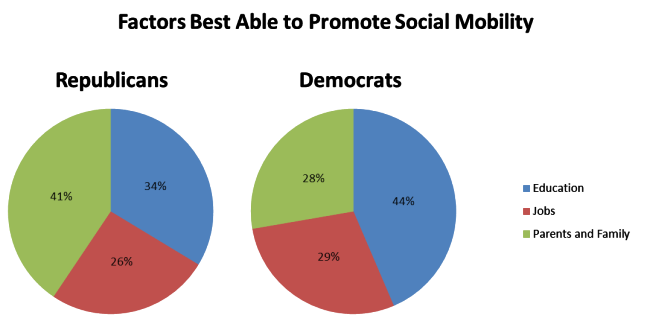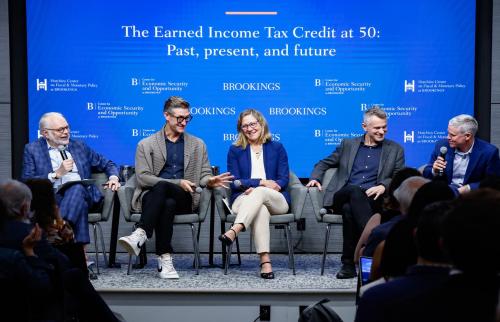Earlier, we reported findings from a new survey on the determinants of social mobility. Most striking was the fact that only a small minority–about 2%–believe preschool education matters most for opportunity later in life. Today we turn to an important pattern masked in those aggregate data: the stark difference in Democrats’ and Republicans’ opinions about what creates social mobility.
Factors for Mobility
Simply, Democrats place a greater emphasis on education and Republicans on family. The pie charts below show the proportion of Democrats and Republicans who thought that the key to social mobility was:
- parents and family,
- education (pre-k, k-12, and college), and
- jobs.
When asked which of these factors was best able to promote social mobility, the most common response from Democrats was education, while Republicans were most likely to attribute social mobility to parents and family.

College, K-12, or Pre-K?
Delving deeper into the data on education, we find that the distinction between the two parties can really be attributed to one particular portion of education: college. Twenty-six percent of Democrats believe that higher education best facilitates mobility, compared to only 16% of Republicans. An interesting corollary to this pattern is that Democrats and Republicans are surprisingly similar in their views of pre-k and k-12 education. Indeed, just 18% of both Democrats and Republicans believe that primary education is the key to social mobility.
In his recent speech, President Obama emphasized the importance of education for social mobility. He said that “higher education may be the surest path to the middle class,” and, of this, his fellow Democrats seem to agree. But without a solid primary education, children will struggle to reach and succeed in college. Ensuring that every child learns the basics in pre-k, elementary, and high school is, thus, the first step that the government can take toward facilitating greater mobility across class boundaries. Unfortunately, to embrace this point, citizens in both parties may require some convincing.
The Brookings Institution is committed to quality, independence, and impact.
We are supported by a diverse array of funders. In line with our values and policies, each Brookings publication represents the sole views of its author(s).




Commentary
Republicans, Democrats Disagree on Factors for Social Mobility
December 12, 2013